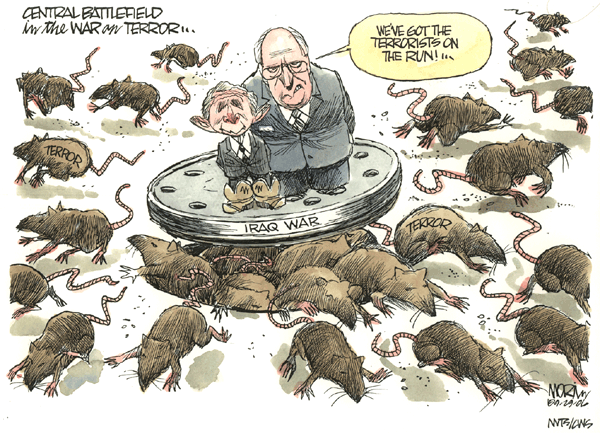Thursday, October 19, 2006
The Guardian: Iraq war cost years of progress in Afghanistan - UK brigadier

Commander echoes criticism of Blair's foreign policy by head of army
Richard Norton-Taylor
Wednesday October 18, 2006
The Guardian

Iraqis celebrate as a British military SUV burns after being hit by a rocket propelled grenade in Basra, Iraq. Photo: Nabil al-Jurani/AP
Brigadier Ed Butler, commander of 3 Para battlegroup just returned from southern Afghanistan, said the delay in deploying Nato troops after the overthrow of the Taliban in 2002 meant British soldiers faced a much tougher task now.
Asked whether the invasion of Iraq and its aftermath had led to Britain and the US taking their eye off the ball, Brig Butler said the question was "probably best answered by politicians".
But echoing criticisms last week by General Sir Richard Dannatt, the head of the army, he added that Iraq had affected operations in Afghanistan. "We could have carried on in 2002 in the same way we have gone about business now.
"Have the interim four years made a difference? I think realistically they have," Brig Butler told journalists in London. Since then, he added, Britain had "marked time" and British troops were now "starting to make up for that time".
He said later it would be inappropriate to associate Iraq with Afghanistan; they were different problems.
Gen Dannatt last week questioned the decision to invade Iraq, saying the military campaign in 2003 "effectively kicked the door in" and that British troops should leave "sometime soon" - by which he made it clear he meant within two years.
Brig Butler said yesterday that British forces could also have attacked the Taliban more effectively and more quickly if they had had more resources, including helicopters, though he added that British commanders had to face "realities".
There are more than 5,000 British troops in southern Afghanistan and more than 7,000 in southern Iraq. Though British military chiefs say publicly that they could sustain that number for the time being, they make it clear they cannot do so for much longer.
Pressed on the issue yesterday, the prime minister insisted British forces would not "walk away" from either country, and again insisted that he was not at odds with Gen Dannatt. "If we walk away before the job is done from either of those two countries, we will leave a situation in which the very people we are fighting everywhere, including the extremism in our own country, are heartened and emboldened and we can't afford that to happen."
Brig Butler also gave fresh insight into the strain that fighting in two different theatres was creating for the army. He disclosed that at times in southern Afghanistan his men had been down to "belt rations" - water and basic supplies which normally last no more than two days. "It got pretty close. We never actually ran out but that was the nature of the conflict," he said. He added that they were never in danger of being overrun by Taliban forces though on occasion it "got pretty close".
Brig Butler said he believed that they had "tactically defeated" the Taliban. However, he warned they could regroup over the winter; it was now essential to press ahead with reconstruction projects to convince the local population that the Nato operation was worth supporting.
"If we take our eye off the ball and we don't continue to invest in it, there is a danger they [the Taliban] will come back in greater numbers next year," he said.
He said the ferocity of the fighting over the summer had taken some of his troops by surprise. "I think we might have been surprised on occasion how persistent the attacks were and how enduring the scale of the operation was," Brig Butler said.
He said it was "very clear" that the campaign to secure Afghanistan would be a long one. "I suspect there will be some elements of the international community there in 20 years' time," he said, referring mainly to aid agencies.
It was disclosed yesterday that British troops had pulled out of the Musa Qala district in the northern part of Helmand province under a deal with local tribal elders. Brig Butler insisted he had not been involved in any negotiations with the Taliban and expressed confidence that the agreement would hold. "I think it is a positive sign that they are delivering their own security," he said.
Full coverage
Special report: Afghanistan